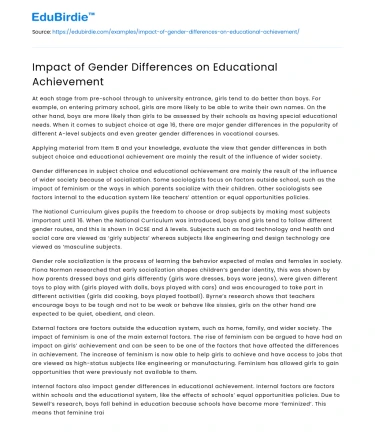At each stage from pre-school through to university entrance, girls tend to do better than boys. For example, on entering primary school, girls are more likely to be able to write their own names. On the other hand, boys are more likely than girls to be assessed by their schools as having special educational needs. When it comes to subject choice at age 16, there are major gender differences in the popularity of different A-level subjects and even greater gender differences in vocational courses.
Applying material from Item B and your knowledge, evaluate the view that gender differences in both subject choice and educational achievement are mainly the result of the influence of wider society.
Save your time!
We can take care of your essay
- Proper editing and formatting
- Free revision, title page, and bibliography
- Flexible prices and money-back guarantee
Gender differences in subject choice and educational achievement are mainly the result of the influence of wider society because of socialization. Some sociologists focus on factors outside school, such as the impact of feminism or the ways in which parents socialize with their children. Other sociologists see factors internal to the education system like teachers’ attention or equal opportunities policies.
The National Curriculum gives pupils the freedom to choose or drop subjects by making most subjects important until 16. When the National Curriculum was introduced, boys and girls tend to follow different gender routes, and this is shown in GCSE and A levels. Subjects such as food technology and health and social care are viewed as ‘girly subjects’ whereas subjects like engineering and design technology are viewed as ‘masculine subjects.
Gender role socialization is the process of learning the behavior expected of males and females in society. Fiona Norman researched that early socialization shapes children’s gender identity, this was shown by how parents dressed boys and girls differently (girls wore dresses, boys wore jeans), were given different toys to play with (girls played with dolls, boys played with cars) and was encouraged to take part in different activities (girls did cooking, boys played football). Byrne’s research shows that teachers encourage boys to be tough and not to be weak or behave like sissies, girls on the other hand are expected to be quiet, obedient, and clean.
External factors are factors outside the education system, such as home, family, and wider society. The impact of feminism is one of the main external factors. The rise of feminism can be argued to have had an impact on girls’ achievement and can be seen to be one of the factors that have affected the differences in achievement. The increase of feminism is now able to help girls to achieve and have access to jobs that are viewed as high-status subjects like engineering or manufacturing. Feminism has allowed girls to gain opportunities that were previously not available to them.
Internal factors also impact gender differences in educational achievement. Internal factors are factors within schools and the educational system, like the effects of schools’ equal opportunities policies. Due to Sewell’s research, boys fall behind in education because schools have become more ‘feminized’. This means that feminine traits such as attentiveness have been prioritized which as a result disadvantaged boys.
The gender gap in achievement increased after the introduction of GCSEs and coursework in 1998. Mitsos and Browne's research shows that girls are more successful in coursework because they are better organized and more conscientious than boys. They found that girls like to spend more time on their work, take more care of its presentation, and are better at keeping deadlines. Sewell argues that some of the coursework should be replaced with final exams.
Jo Boaler argues that equal opportunities policies such as GIST (Girls into science and technology) and WISE (Women into science and engineering) are key factors in the improvement of girls' educational performance. The equal opportunities prioritized girls to have equal access to every subject and encourage girls to do more.






 Stuck on your essay?
Stuck on your essay?

